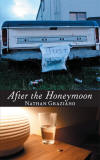After the Honeymoon
The characters that populate Nathan Graziano’s new book of poetry, After the Honeymoon, remind me of my neighbors and friends growing up in working class Philadelphia: many of these folks had rough, troubled lives, and more often than not happiness was squelched by substance abuse, poverty, poor education, and unemployment. It was the rare exception that someone had the self-reflection and self-discipline to ascend the neighborhood’s social pitfalls. While Graziano’s book could be set in almost any working poor urban area in our country, its depictions of hard-scrabbled living – and the desire to rise above it – is utterly familiar to my autobiography and is refreshing to see in contemporary poetry.
The characters that populate Nathan Graziano’s new book of poetry, After the Honeymoon, remind me of my neighbors and friends growing up in working class Philadelphia: many of these folks had rough, troubled lives, and more often than not happiness was squelched by substance abuse, poverty, poor education, and unemployment. It was the rare exception that someone had the self-reflection and self-discipline to ascend the neighborhood’s social pitfalls. While Graziano’s book could be set in almost any working poor urban area in our country, its depictions of hard-scrabbled living – and the desire to rise above it – is utterly familiar to my autobiography and is refreshing to see in contemporary poetry.
Most of the poems are located within chaotic and troubled existences – lives of alienation, alcoholism and recovery, spousal violence, etc. I have a large amount of admiration for Graziano and his speakers who are determined to find meaning and beauty in the many faces of social dysfunction. However, the predominate voice in the book is one of hindsight, and since the voice has already overcome his demons and has found an implied remedy, the poems lose any sense of urgency and instead are replaced by a conventional wisdom. The poet often outright moralizes to the reader, as if, now in the present, a lesson on human frailty is needed. This framework ostensibly renders the reader passive, like a new member of AA listening to the wiser leader. A prime example resides in the sad, quiet narrative poem of post-Christmas, “The Onset of Dark”:
The Christmas tree is bagged in plastic,
a corpse tossed beside the curb,
its stiff needles splayed in dirt and snow.
The eggnog in the fridge has spoiled
beside six headless gingerbread men,
one pardoned by the dog on New Year’s Day.
I could walk to the liquor store
with my eyes closed, sniffing out patches
of black ice that threaten to snap my neck.
The poem, by all accounts, is put together well. There’s an attention to line and music. The narrative is economical and in the second stanza, there’s good humor. Moreover, the third stanza sets up the revelation through the natural image of winter –a return to the opening three lines. In terms of craft, this poem works. However, this poem – like so many in the book – rarely illustrate any struggle and ambiguity, rarely bares a soul. Given that this kind of poem dominates the book, one begins to feel bored by all the previously arrived self-realizations.
And while the poems do pay an assiduous attention to stanzaic movement and rhetorical and narrative arcs, I often thought that the language and syntax came up flat on occasion – particularly in those flash fiction/prose poems such as “Road Side Ballet” or “Sweet Dreams.” Specifically, many of the poems in the manuscript – lineated or otherwise – have a strong reliance on subject verb prepositional chain syntactical constructions, and at times, I thought that this brought a flabbiness to the writing, such as the last stanza/paragraph of “Percocets”:
Then R reaches in his pocket and pulls out a fistful of Percocets. The three men grin. And despite the fact that they’ve downed many beers and now have families who love them, as husbands and fathers, they pop the pills in their mouths. Because they used to be immortal, don’t forget that. And tell it to the paramedics when they arrive for the man who stopped breathing.
In the desire to dramatically drive home the point, Graziano relies on numerous prepositional and conjunctive phrases: At some point, not only is this tic overly-conscious, but there’s simply no musicality or economy, a staple of resonant poetry. This scene could be leaner, less reliant on conditional limiters, and in excision the scene would be more open and the language would truly sing.
When I think of writers who’re writing about gritty living – Carver or Denis Johnson come immediately to mind – they often show men and women still struggling in some way – not so much with substances or jobs but who they are as people. I feel like the narrative of struggle exists in the poems, but often there isn’t the emotional heft or internal contradiction that infuses the narrator of Jesus Son, for instance. Rather, the speaker maintains a controlled distance time and again, and at some point, I want something raw and unrestrained to come boiling over. Otherwise, the book reads like a speech using the conventions of poetry, as opposed to the difficult and complicated struggles of hard living.





